In Difficult Times Good People gravitate towards Absolute Truth
Nowhere Boy
"Nowhere Boy" firmly stresses this one truth that it was John's influence, his personal, and most dramatic angst that acted as a bold adhesive to build this rare, super band. This film correctly kept the dramatic measure in a perfect harmonic ratio with the drama of John's imperfect childhood, which kept the story believable, perfectly paced, a fine fit of dramatic resistance, and personal perseverance of our young lead, which was very well cast in Aaron Taylor-Johnson, who at 18 years age played John between 14 and 18 years of age, showed a fine talent that will serve the young actor well as he grows through other future films certain to come his way.
This role was so different in tone and scale from his next film, the cult classic "Kick-Ass," where he played the titular role, and yet had the understanding and the talent to play both with such rare conviction for an actor his age. If "Nowhere Boy" had been cast with a lesser talent, I am most sure the film would have been far less successful in translating the complicated, but significant beginning of this one Liverpool lad.

Their intertwined lives were fraught with confrontation, with much of it over John, for Julia, Anne-Marie Duff, (left) and Mimi Smith, Kristen Scott Thomas (right): Above.
"Nowhere Boy's" most resounding success was the strongly implied duality of these two sisters' influence on this lead Beatle - John - both good. Julia, though seriously flawed with huge emotional stability issues, influenced his love of music, and the creation of music. Mimi was the sensibility, the sturdy rock that lent the firm foundation to support John to do so. The film's second success was its treatment of the beginning of The Beatles.
John Lennon loved attention: from his family, his school chums, playing the "class clown," the ladies. Starting a rock'n'roll band in the first generation of rock'n'roll bands, was a natural progression for the expressive John. This part of the film, while not intrinsic in telling us why John became a Beatle, was the climax to film's resolution, and was certainly another part of the story well presented, well told.
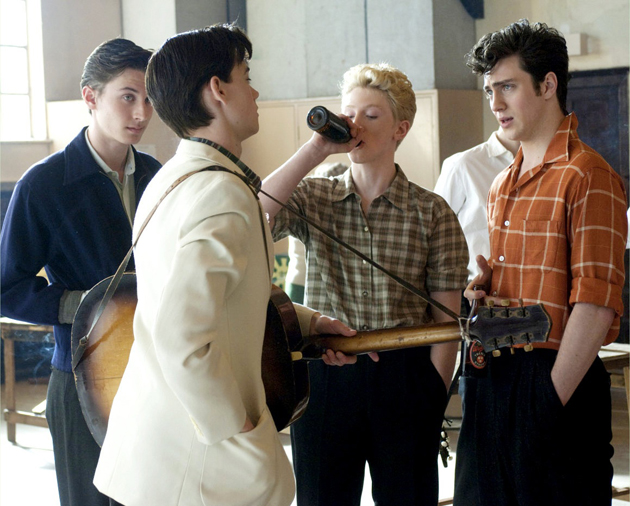
A young Paul McCrtney, played quite well by Thomas Brodie-Sangster, pleads his case to John as to why he would be a positive addition to The Quarrymen: Above and below.
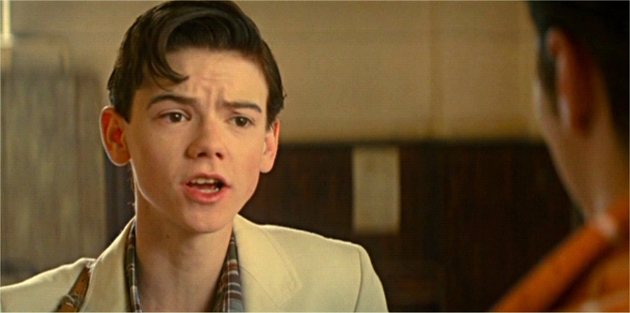
The Beatles began as The Quarrymen in 1957, named for John's Quarry Bank High School, and, suitably, was comprised of John's classmates. While the band was interesting to the locals, it was still just a beginning of a group of lads that showed some small measure of promise, until their second gig in Woolton at St. Peter's Church bought them a new member. Here, Paul McCartney met the group and asked if he could join the band. Even though band leader John Lennon was understandably threatened by the new lad's musical prowess, John's allowing Paul to join the band was the best decision he ever made, with John taking up the guitar some years earlier a close second.
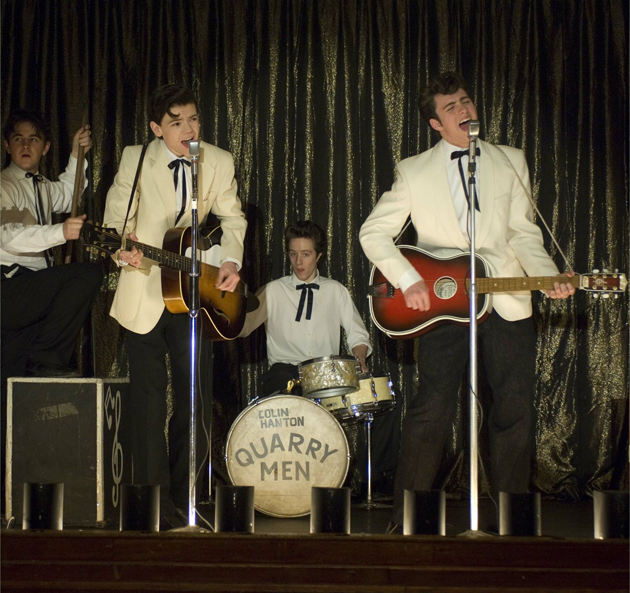
The Quarrymen with Paul McCartney, Thomas Brodie-Sangster, (left), and John Lennon (right), Aaron Taylor-Johnson, play local gigs: Above. Paul McCartney, Thomas Brodie-Sangster, (left), and John Lennon (right), Aaron Taylor-Johnson, begin their productive collaboration that produced hundreds of tunes that are well beloved still: Below.

Within the next long months after beginning the band and hiring Paul McCartney to help with band's creative impetus, John and The Quarrymen would: play all over the Liverpool region of England, hire a 14 year old George Harrison to play lead guitar, hire Stuart Sutcliffe to play bass guitar, and generally made a name for themselves as a regional talent. In 1960 the band would find a drummer in Pete Best and began playing Hamburg, Germany, where the band changed their name to The Beatles, honed their craft, their talents into a cohesive musical ensemble, and thus began to form a huge following all over Europe.
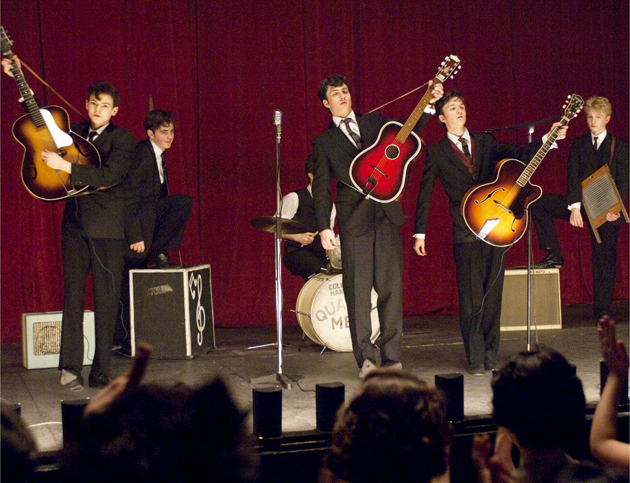
The Quarrymen finding their three frontmen: Paul McCartney (left), Thomas Brodie-Sangster, John Lennon (center), Aaron Taylor-Johnson, and George Harrison (right), Sam Bell: Above. In the beginning it was John and his guitar, which cost 5 pounds, 6 shillings: Below.
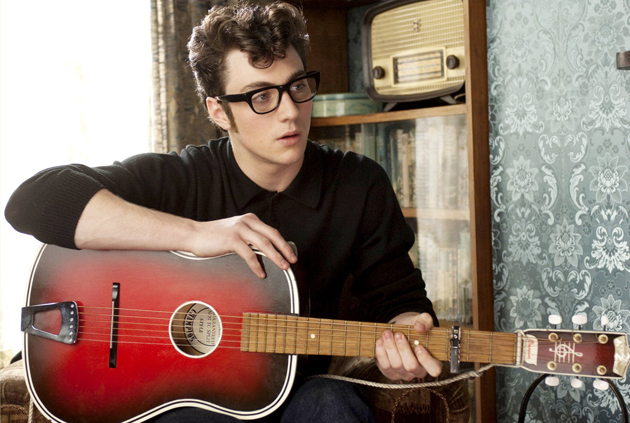
In 1962, The Beatles would: hire Brian Epstein as a business manager, lost Sutcliffe and Best, hired Ringo Starr to play drums, Paul took over the duties on bass guitar, released their first single, "Love Me Do," their first album of 14 songs, "Please, Please Me," "and the rest," as the cliche speaks, "is history." And what a history it all turned out to be: Music that resonated with my generation, and now music that all of my children, who were born between 1982 and 1991 love, and one loves to play on the piano. I love to hear my son play the keyboard The Beatles, and I suppose I have John Lennon to thank for that.
On second thought, I may have Julia and Mimi to thank as well.

And also in the beginning of John's musical development, it was Julia (center), Anne-Marie Duff, who enthusiastically expressed her approval of her son's unique talent: Below.
Released on DVD January 25, 2011, Rated R, 98 minutes of runtime.
Come join us at our new Movie Database. We welcome you our latest feature to sort through film data to discover information on actors, directors, film images, or just what is playing, when it will pay, or when it did play. It is a work in progress, so we would appreciate your input.
Go Back
This role was so different in tone and scale from his next film, the cult classic "Kick-Ass," where he played the titular role, and yet had the understanding and the talent to play both with such rare conviction for an actor his age. If "Nowhere Boy" had been cast with a lesser talent, I am most sure the film would have been far less successful in translating the complicated, but significant beginning of this one Liverpool lad.

"Nowhere Boy's" most resounding success was the strongly implied duality of these two sisters' influence on this lead Beatle - John - both good. Julia, though seriously flawed with huge emotional stability issues, influenced his love of music, and the creation of music. Mimi was the sensibility, the sturdy rock that lent the firm foundation to support John to do so. The film's second success was its treatment of the beginning of The Beatles.
John Lennon loved attention: from his family, his school chums, playing the "class clown," the ladies. Starting a rock'n'roll band in the first generation of rock'n'roll bands, was a natural progression for the expressive John. This part of the film, while not intrinsic in telling us why John became a Beatle, was the climax to film's resolution, and was certainly another part of the story well presented, well told.


The Beatles began as The Quarrymen in 1957, named for John's Quarry Bank High School, and, suitably, was comprised of John's classmates. While the band was interesting to the locals, it was still just a beginning of a group of lads that showed some small measure of promise, until their second gig in Woolton at St. Peter's Church bought them a new member. Here, Paul McCartney met the group and asked if he could join the band. Even though band leader John Lennon was understandably threatened by the new lad's musical prowess, John's allowing Paul to join the band was the best decision he ever made, with John taking up the guitar some years earlier a close second.


Within the next long months after beginning the band and hiring Paul McCartney to help with band's creative impetus, John and The Quarrymen would: play all over the Liverpool region of England, hire a 14 year old George Harrison to play lead guitar, hire Stuart Sutcliffe to play bass guitar, and generally made a name for themselves as a regional talent. In 1960 the band would find a drummer in Pete Best and began playing Hamburg, Germany, where the band changed their name to The Beatles, honed their craft, their talents into a cohesive musical ensemble, and thus began to form a huge following all over Europe.


In 1962, The Beatles would: hire Brian Epstein as a business manager, lost Sutcliffe and Best, hired Ringo Starr to play drums, Paul took over the duties on bass guitar, released their first single, "Love Me Do," their first album of 14 songs, "Please, Please Me," "and the rest," as the cliche speaks, "is history." And what a history it all turned out to be: Music that resonated with my generation, and now music that all of my children, who were born between 1982 and 1991 love, and one loves to play on the piano. I love to hear my son play the keyboard The Beatles, and I suppose I have John Lennon to thank for that.
On second thought, I may have Julia and Mimi to thank as well.

Released on DVD January 25, 2011, Rated R, 98 minutes of runtime.
Come join us at our new Movie Database. We welcome you our latest feature to sort through film data to discover information on actors, directors, film images, or just what is playing, when it will pay, or when it did play. It is a work in progress, so we would appreciate your input.
| Why the Turnage cannot be saved | Local News & Expression, DVD Reviews, Movie Reviews, The Arts | Oz the Great and Powerful |























